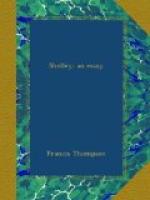Yet, just as in the effete French society before the Revolution the Queen played at Arcadia, the King played at being a mechanic, everyone played at simplicity and universal philanthropy, leaving for most durable outcome of their philanthropy the guillotine, as the most durable outcome of ours may be execution by electricity;—so in our own society the talk of benevolence and the cult of childhood are the very fashion of the hour. We, of this self-conscious, incredulous generation, sentimentalise our children, analyse our children, think we are endowed with a special capacity to sympathise and identify ourselves with children; we play at being children. And the result is that we are not more child-like, but our children are less child-like. It is so tiring to stoop to the child, so much easier to lift the child up to you. Know you what it is to be a child? It is to be something very different from the man of to-day. It is to have a spirit yet streaming from the waters of baptism; it is to believe in love, to believe in loveliness, to believe in belief; it is to be so little that the elves can reach to whisper in your ear; it is to turn pumpkins into coaches, and mice into horses, lowness into loftiness, and nothing into everything, for each child has its fairy godmother in its own soul; it is to live in a nutshell and to count yourself the king of infinite space; it is
To see a world in a grain of sand,
And a heaven in
a wild flower,
Hold infinity in the palm of your
hand,
And eternity in
an hour;
it is to know not as yet that you are under sentence of life, nor petition that it be commuted into death. When we become conscious in dreaming that we dream, the dream is on the point of breaking; when we become conscious in living that we live, the ill dream is but just beginning. Now if Shelley was but too conscious of the dream, in other respects Dryden’s false and famous line might have been applied to him with very much less than it’s usual untruth. {5} To the last, in a degree uncommon even among poets, he retained the idiosyncrasy of childhood, expanded and matured without differentiation. To the last he was the enchanted child.
This was, as is well known, patent in his life. It is as really, though perhaps less obviously, manifest in his poetry, the sincere effluence of his life. And it may not, therefore, be amiss to consider whether it was conditioned by anything beyond his congenital nature. For our part, we believe it to have been equally largely the outcome of his early and long isolation. Men given to retirement and abstract study are notoriously liable to contract a certain degree of childlikeness: and if this be the case when we segregate a man, how much more when we segregate a child! It is when they are taken into the solution of school-life that children, by the reciprocal interchange of influence with their fellows, undergo the series of reactions which converts them from children into boys and from boys into men. The intermediate stage must be traversed to reach the final one.




